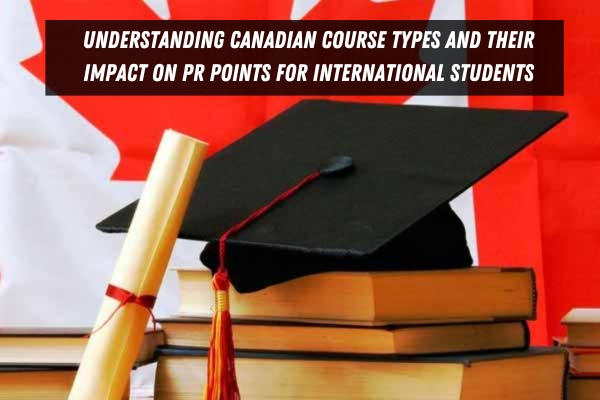Canada has become a top destination for international students seeking high-quality education and the opportunity to build a future in a diverse and welcoming country. For those considering the pathway to Permanent Residency (PR), understanding how different types of educational programs influence your PR prospects is crucial. This blog will delve into the various types of courses available in Canada and how they can affect your PR application, particularly through the Comprehensive Ranking System (CRS) used in Express Entry.
Understanding the impact of different educational programs on your Permanent Residency (PR) prospects in Canada is crucial for several reasons:
1.Optimizing Your CRS Score:
The Comprehensive Ranking System (CRS) is a points-based system used to assess and rank candidates in the Express Entry pool. Your educational qualifications play a significant role in determining your CRS score, which impacts your chances of receiving an Invitation to Apply (ITA) for PR. By understanding how different types of programs contribute to your CRS score, you can make informed decisions that maximize your points and enhance your PR prospects.
2. Making Informed Educational Choices
Opt for programs that are known to align with pathways to Permanent Residence. For instance, certain fields like engineering, IT, healthcare, and business often have clearer pathways to PR due to their high demand in Canada. Ensure that the educational institution is designated by the Canadian government and that the program qualifies for a Post- Graduation Work Permit (PGWP), which is essential for gaining Canadian work experience.
3. Strategic Career Planning
After completing your studies, secure a job related to your field of study. Canadian work experience is a crucial factor in applying for PR through the Canadian Experience Class (CEC) or other immigration programs. Aim to accumulate work experience in your field as early as possible. Many provinces have PNPs that target specific skills or professions. Research which provinces have programs that match your qualifications and career goals. Some PNPs offer pathways to PR for individuals with experience in particular sectors or regions. Networking with professionals in your field can help you secure job opportunities and gain valuable advice on navigating the PR process. Join industry associations, attend career fairs, and participate in local events to build connections.
4. Navigating Immigration Processes
Understand PR Eligibility Criteria. Familiarize yourself with the eligibility criteria for different PR programs, such as the Federal Skilled Worker Program, Federal Skilled Trades Program, and Canadian Experience Class. Each program has specific requirements related to work experience, language skills, and educational background. If you’ve completed a program eligible for a PGWP, apply for this permit to gain Canadian work experience. The duration of the PGWP depends on the length of your study program and can significantly impact your PR application. Keep track of immigration changes.
5. Maximizing Return on Investment
Evaluate the Long-Term Benefits of PR. Consider how obtaining PR will benefit you in the long term. PR status allows you to live, work, and study in Canada permanently, access social services, and apply for Canadian citizenship in the future. Assess the return on investment based on the stability and opportunities PR provides compared to the cost of education and living expenses.
6. Avoiding Common Pitfalls
Understanding the implications of different educational programs on your PR application is essential for making informed decisions, optimizing your CRS score, and successfully navigating the Canadian immigration system. It ensures that your educational investment aligns with your career and immigration aspirations, ultimately enhancing your chances of achieving Permanent Residency in Canada.
For international students in Canada, different types of educational programs can impact your eligibility for Permanent Residency (PR) through the Canadian immigration system. The Canadian immigration system, particularly the Express Entry system, uses points-based system where educational credentials can contribute to your Comprehensive Ranking System (CRS) score. Here’s how different types of courses and programs generally affect PR points:
1. University Undergraduate Programs
Types:
– Bachelor’s Degrees (e.g., B.A., B.Sc., B. Com)
– Diplomas (often less common for international students aiming for PR)
PR Points:
– Bachelor’s Degrees: Generally, a Canadian bachelor’s degree can contribute significantly to your CRS score. Completing a program of at least two years generally qualifies you for up to 120 points for education under the CRS.
– Diplomas: A diploma might not provide as many points as a degree, especially if it’s a shorter program. However, a one- year diploma can still provide points under the CRS, typically up to 90 points.
2. University Graduate Programs
Types:
– Master’s Degrees (e.g., M.A., M.Sc., MBA)
– Doctoral Degrees (e.g., Ph.D., Ed.D.)
PR Points:
– Master’s Degrees: Canadian master’s degrees typically earn up to 135 points under the CRS for education.
– Doctoral Degrees: A Canadian Ph.D. or equivalent can earn up to 150 points for education under the CRS, which is the highest for education credentials.
3. College Programs
Types:
– Diplomas (e.g., Advanced Diplomas)
– Certificates (e.g., Post-Graduate Certificates)
– Associate Degrees (less common)
PR Points:
– Diplomas and Certificates: These programs usually provide up to 90 points for a one-year diploma or certificate and up to 120 points for a two-year program.
– Associate Degrees: They may be recognized similarly to a diploma or may not offer additional points beyond a two-year diploma.
4. Professional and Continuing Education
Types:
– Professional Development Courses (e.g., for specific certifications)
– Short Courses and Workshops
PR Points:
– Points: Professional and continuing education courses typically do not add significant points for PR purposes unless they lead to a diploma or degree. They may help in enhancing skills or gaining Canadian work experience, which can indirectly affect your CRS score.
5. Online and Distance Education
Types:
– Online Degrees (e.g., online bachelor’s, master’s programs)
– Distance Learning Certificates and Diplomas
PR Points:
– Points: Online degrees from Canadian institutions are generally treated similarly to in-person degrees. They can earn the same points under the CRS if the program is recognized as equivalent to an in-person degree.
6. Language Programs:
Types:
– English as a Second Language (ESL) Programs
– French Language Courses
PR Points:
– Points: Language programs themselves do not contribute directly to the CRS score, but proficiency in English or French can significantly boost your CRS score through language ability points. Achieving high scores in language proficiency tests (like IELTS or TEF) is crucial.
Additional Considerations
– Post-Graduation Work Permit (PGWP): Completing a recognized Canadian program can make you eligible for a PGWP, which allows you to gain Canadian work experience. This work experience can further enhance your CRS score.
– Canadian Experience Class (CEC): Accumulating Canadian work experience through a PGWP can increase your CRS score significantly.
Summary
– Bachelor’s Degrees: Up to 120 points.
– Master’s Degrees: Up to 135 points.
– Doctoral Degrees: Up to 150 points.
– Diplomas and Certificates: Up to 90-120 points, depending on duration.
– Professional and Continuing Education: Generally, not points-based unless leading to a diploma or degree.
– Online Degrees: Points equivalent to in-person degrees.
– Language Programs: Boost language ability points, not directly points-based.
For the most accurate and personalized advice, it’s best to consult with an education consultant or advisor to understand how specific programs and qualifications will impact your PR application based on the latest immigration policies.
Transform your academic ambitions into reality with Focus Education! Explore the endless possibilities of studying in Canada, where exceptional education meets exciting career prospects. From tailored program selection and seamless application processes to expert visa guidance and post-graduation career support, Focus Education ensures you navigate every step with confidence. Start your journey towards a world-class education and a future full of opportunities. With Focus Education, your path to success in Canada is clear and achievable.



